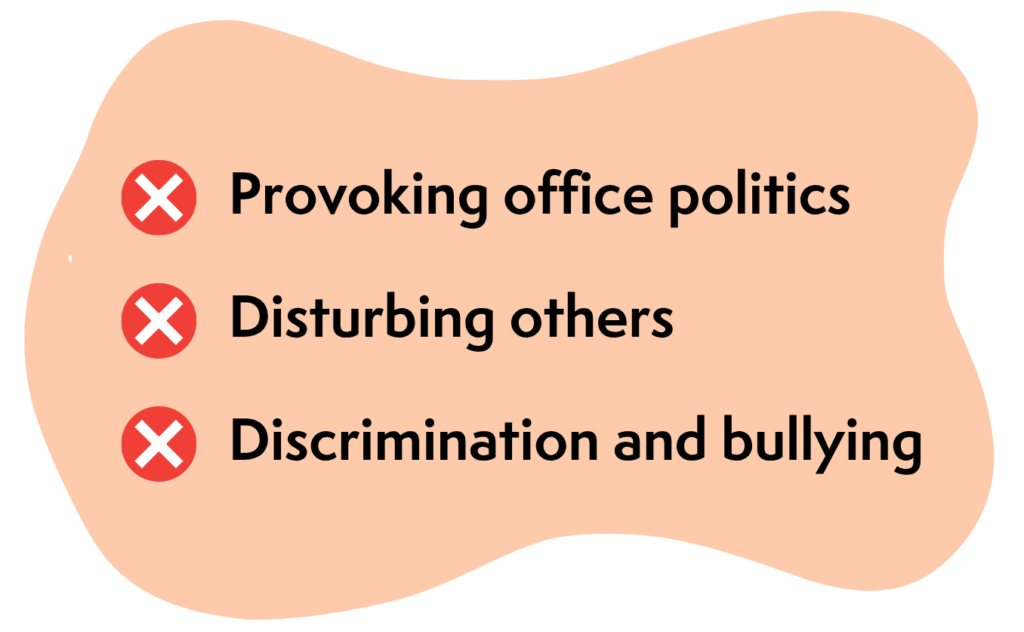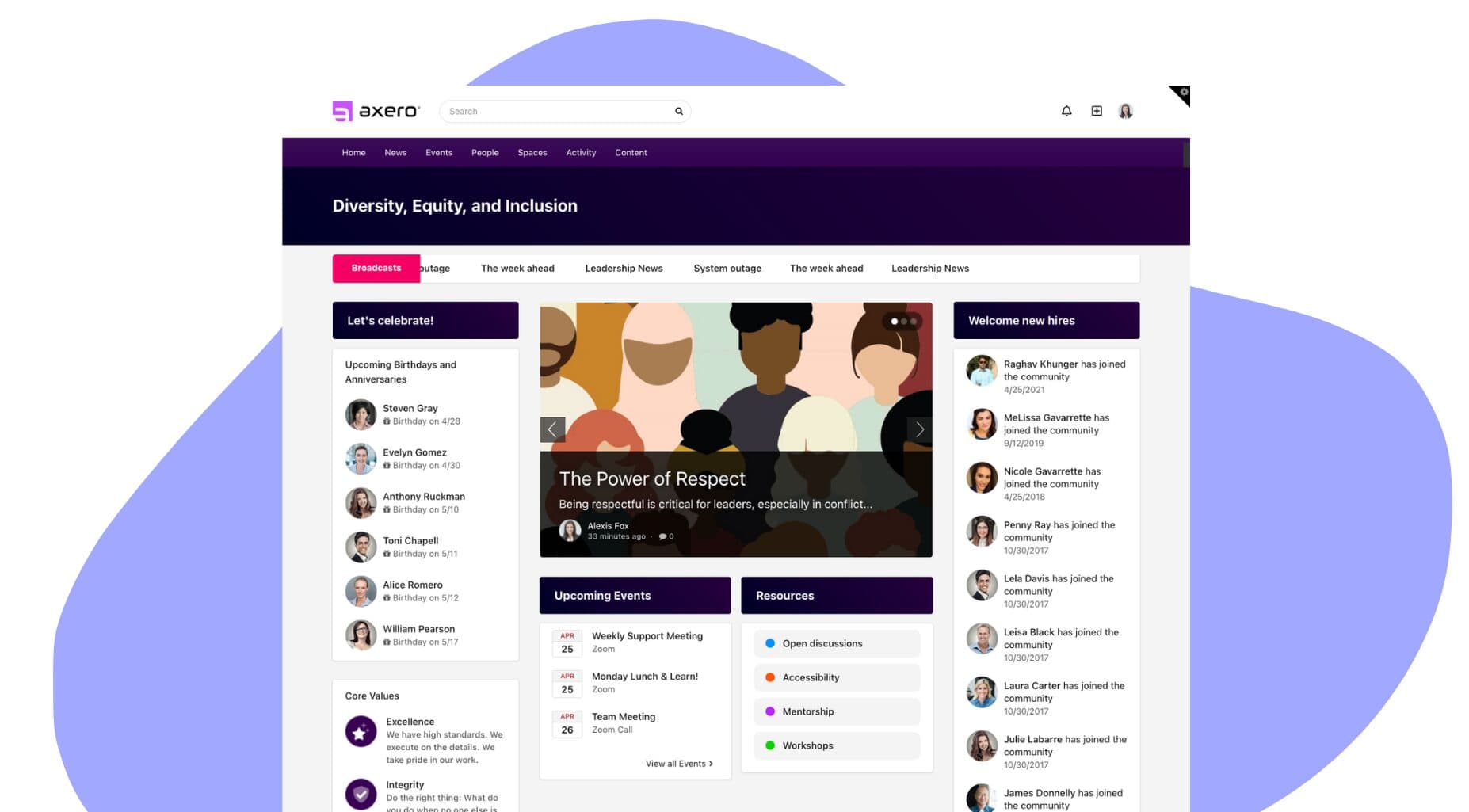Universally speaking, there’s clear do’s and don’ts when it comes to professionalism in the workplace. No matter how laid back of an environment you work in, or how comfortable you are with your team, there’s a general code of conduct that every professional should follow.
The thing is, though, that while professional behavior is fundamental to every employed person, what it means and how you should act varies. Also, depending on prior experiences, professionalism is also subjective—now more than ever as some workplaces lean towards casual. You may luck out, though. Organizations with strong company values, employee handbooks, or rely on a company intranet might give clear standards about what accounts for good behavior. Still, no one is going to give you a full lesson of how to be professional; it’s expected.
Professionalism in the workplace is usually learned through experience. The problem is that what you pick up on is dependent on where you are—and what works in one place might not work in another. Let’s take a closer look at what good professionalism in the workplace looks like, and why we need to present our best selves when representing our employers and working with our employees.
What is professionalism in the workplace?
Professionalism in the workplace can vary wildly depending on where you work and who you work for. An attorney’s office, for example, will likely be an extremely different working environment than a live music venue.
So with that in mind, taking a broader approach, if we were to broadly define professionalism it would be how you carry yourself in a work capacity. Your attitude, your interactions with colleagues, customers, and members of the public, the way you handle conflict and even the way you dress can all tie into how your professionalism is perceived by others.
Professional behavior needs to be exhibited by the entire organization if you are going to be taken seriously in your field. This does not mean that you can’t be playful or let your personality shine. There are many ways to have a fun and laidback business persona without sacrificing professionalism.
What are professional behaviors?
As we already mentioned, what’s deemed as appropriate behavior varies depending on:
- The industry you work in
- The niche your organization exists in
- Your role within the company
- Who you’re interacting with
A brand new hire who’s eager to give a positive first impression will act differently than a long-tenured executive assistant. In another scenario, if you work in healthcare, it is both unprofessional and unethical to discuss patient information outside of work. There’s always been longstanding factors that determine professionalism in different settings, but as “professional” workplace rules continue to evolve, there still remains universal behaviors that the majority of employers look for:
Honoring commitments
If you make a promise, fulfill it. Many roles nowadays see a professional as an employee who is honest, reliable, and is a responsible person. They can set their own deadlines, deliver on timelines given to them, and manage their workloads. When you gain the reputation as the person who’s constantly moving meeting deadlines or sporadically responding to emails, you become an unreliable teammate.
Honor your commitments and manage your time. No one’s perfect and there will surely be some deadlines that you’ll have to move, but there’s a way to do it graciously and with as much thought given to the other parties and their needs as possible.
Engaging with workplace culture
Interpersonal skills are key. A good workplace will create and nurture a specific culture for its employees to be a part of and grow within. Even a workforce that is entirely remote can still enjoy a workplace culture through employee platforms like intranets that encourage everyone to come together and remain connected. Choosing to engage with workplace culture helps build successful interpersonal relationships with other members of your team and makes work a much more enjoyable experience. Coworkers don’t need to be your best friends, but you do need to know how to get along with them.
Dressing appropriately
Trends show that today’s professional attire has become much more relaxed. But again, depending on your work environment and especially if you’re a new hire, maintaining a put together look is an unspoken rule in many offices. Even if you work remotely, it’s likely expected for you to look presentable when you hop on a call with customers or leadership. Yesterday’s stained hoodie and a messy background might be a no, but a clean shirt and some basic styling can hide the fact you are wearing sweats or pajama pants under your desk.
Leave personal matters at the door
At some point in time, we all experience personal struggles. Sometimes, it’s unavoidable to keep these issues separate from our work lives. When possible, though, it’s best practice to draw a line between personal and professional—and maintain it. Whether you are customer-facing or having one-on-one calls with a colleague, refrain from oversharing every personal issue you’re experiencing. At the end of the day, managing your emotions and workload is what’s expected out of professionals.
What are unprofessional behaviors at work?
Similar to how there’s universal professional behaviors, there’s most definitely universal unprofessional behaviors. Regardless of the industry or type of workplace, these include:
Provoking office politics
Ideally, a team will work well together, be civil to each other, and leave the cliques and drama outside of work. Unfortunately, this isn’t always the case, and rival camps can form around the employees who don’t get along. This causes a multitude of issues and is only made worse when someone takes it upon themselves to provoke the politics.
When you have someone causing drama and pitting people against each other, it hinders productivity and creates a very toxic work environment. Office politics are, unfortunately, likely to happen even in what might appear to be the most harmonious of teams on the surface. Knowing the practical strategies required to get past the drama and complete tasks without provoking either side is a must.
Disturbing others
We all like to have some water cooler chat, but we have to balance socializing and work time. There’s a time and place for gossip and idle chat. Being the person who’s always starting up a conversation is distracting and prevents people from keeping up with their tasks.
Try to limit non-work-related conversations to breaks and lunch. Give space to colleagues who are focusing on their projects and save the comments about football or your neighbors for later.
Unethical and inappropriate behavior in the workplace
We want to keep the workplace light and cheery but it’s important to note that there is a wide spectrum of unprofessional behavior in the workplace. Some of the behaviors we’ve already listed can be addressed and fixed; others are unethical and completely unacceptable in a place of work.
Bullying, harassment, and discrimination have no place in an office environment, ever. Allowing behavior that targets someone’s:
- Appearance
- Ethnicity or nationality
- Religion and/or culture
- Physical and/or mental disability
- Educational background
- Personal life circumstances
has no place in a functional and welcoming place of work. Anyone demonstrating these behaviors needs to immediately be disciplined and in some cases, dismissed from their job.
What is the effect of a lack of professionalism in the workplace?
A lack of professionalism in the workplace has a waterfall effect that will create a poor working environment, especially if it goes unchecked. Left long enough, it could have a significant impact on teams. A long-term lack of professionalism could cause:
Toxic atmosphere
First and foremost, a lack of professionalism could create a toxic atmosphere within a team. No one wants to interact with each other, communication is non-existent, and everyone is on edge. Any attempt at constructive criticism may be viewed as an attack, or it could even just be destructive criticism masquerading as something helpful.
Lack of respect
Respect goes both ways. In an unprofessional and toxic work environment, managers don’t respect their teams, and their teams certainly don’t respect their managers. On top of this, no one actually respects their job and they’re not taking responsibility for their own tasks. With a sense of apathy settling over the office, motivation is dead and unlikely to come back.
No engagement or initiative
No motivation means no engagement. No engagement means that tasks are done with the absolute bare minimum effort. And when a problem happens, no one wants to solve it. No initiative, no creative thinking, just people showing up day after day to do as little as possible within their own self-imposed boundaries.
Poor retention and talent loss
So, what does all of this lead to? People getting bored and looking for new opportunities elsewhere, of course. Where would you rather work, the place with coworkers that sap all your creative and social energy as you try to climb a mountain of unengaging tasks, or the fun and challenging role with a team that listens to your ideas and cheers you on every step of the way? Unprofessional behavior will lead to high employee turnover and talent loss, simply because your employees will realize that their time and energy are best suited somewhere where they are actually appreciated.
Strategies to improve professionalism
So, if you think the levels of professionalism are dropping around your place of work, what can you do to fix it? It might take change the energy and get everyone on the right course of action, but consistent behavior will win and bring the changes needed. Strategies to implement to improve professionalism could include:
Leaders setting the example
These kinds of behavioral changes must come from the top. If leadership doesn’t set an example of how to act, employees will not make the changes on their own. Even if they try for themselves, they may feel discouraged when they look further up the corporate ladder and only get indifference in return.
If you want a team that shows up, works hard, and is open to innovation and collaboration, you need a leader who embodies all of these values. Don’t let bad leadership lead to a breakdown in professionalism. At the end of the day, management is not there to be friends with their teams; they are there to lead and inspire them.
Encourage ownership and accountability
If you need employee engagement to take an upswing, you need to give them a platform to do so. Encourage employees to take ownership and accountability of their tasks. It isn’t just a box-ticking exercise, it isn’t just something for them to do, show them how it feeds back into the overall success of the company.
Encouraging ownership and accountability challenges employees to actually show up and do their jobs properly. They understand the value of their role and the work they do, and in turn they will begin to see the consequences of what happens when they let standards drop. Give them the opportunity to be professional and reward them when they step up.
Build professionalism into the company culture
Do you want your employees to be more professional? Set that expectation from their very first day with you. Constructing a company culture from the ground up is no easy feat, but taking the time to do so creates the foundation that could support your employees for years to come.
Your company culture should be a living thing that employees see every time they log onto their intranet portals or when they hop onto a call to chat with colleagues. Build a professional company culture that workers want to engage with and watch them embody it.
Build a professional work culture with Axero
Unprofessionalism starts with a few comments or a bit of a lax attitude, but it can multiply and spread before you know it. This isn’t just something for HR to clamp down on and deliver lectures about pulling together; it is a real issue that needs to be addressed. Ultimately, employees cannot act professionally in a role that they do not care about. They may understand that they have a job to do and expectations of how to fulfill it, but if they do not want to engage with it, then the unprofessional behavior is going to slip through.
Create a company culture that they can be proud of and they want to represent. Make it tangible, make it visible, make it inclusive. Centralize it through a company intranet and give everyone the chance to embody it. Celebrate the highs and strategize the lows.
Axero helps you centralize your culture, connect your people, and nurture professionalism at every level. Book a demo today to see how our intranet empowers teams to thrive.




















 info@axerosolutions.com
info@axerosolutions.com 1-855-AXERO-55
1-855-AXERO-55


